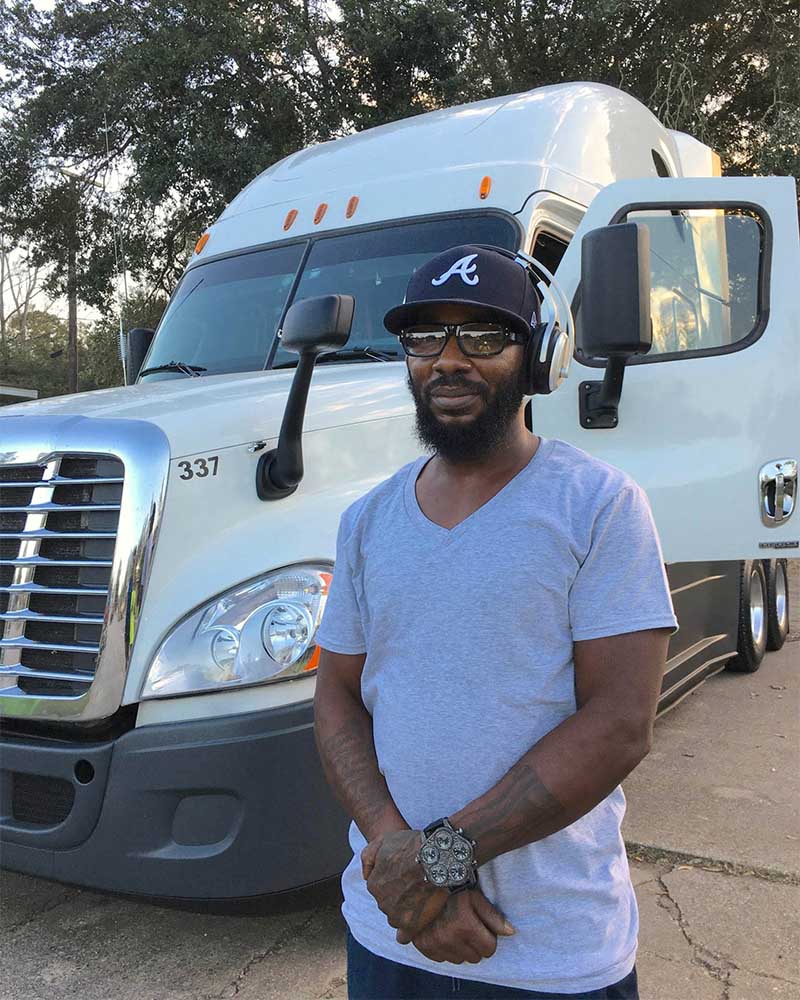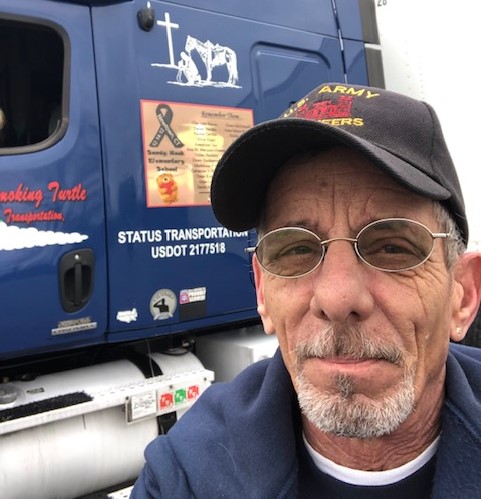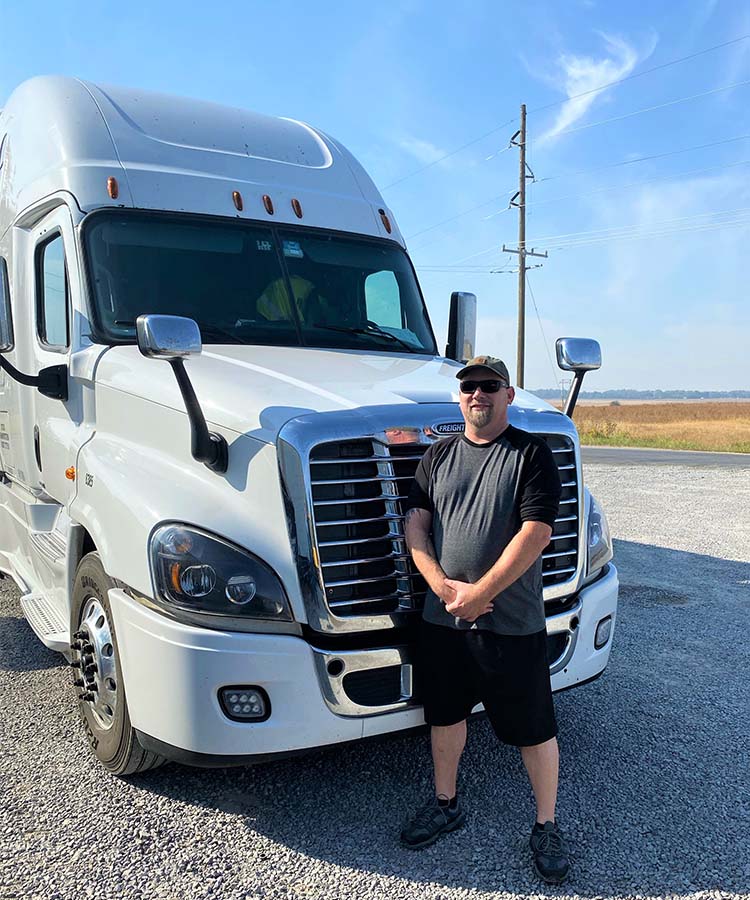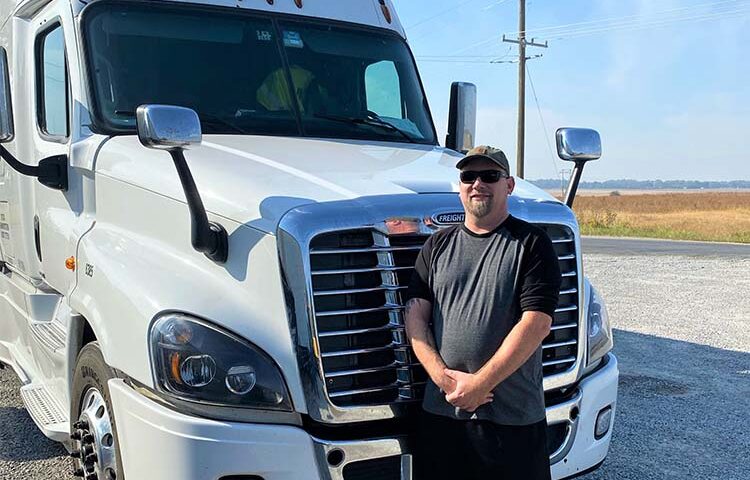
Owner Operator Stories: Dahavin Noel
December 30, 2020
Owner Operator Stories: William Larabee
June 10, 2021Scott Harkin is an accomplished professional truck driver who brings a unique perspective as an Owner Operator.
Every Owner Operator has a different way of seeing the world from the driver’s seat and this month we have Scott Harkin sharing his perspective on what you can expect when starting a trucking career. Many drivers get started in this industry without knowing how to make money in trucking and succeed as a Commercial Driver. Here is Scott’s interview, along with his advice on how to make the most of your Owner Operator experience.
ST: What made you decide to come to this industry?
Scott: I came into this industry as a “do or die” since my body couldn’t handle the construction industry anymore—and I was determined to figure out how to make money in trucking. I was passionate about starting a trucking career because I thought if I can do this, I would still have the opportunity to make the money I want to make in life. When I made up my mind, I was ready to get going, because I knew that it takes time and hard work to figure out what you want to do and to find a reputable trucking company.
Before starting a trucking career, I was working approximately 80 hours a week, 7 days a week, at a gas station. Every day I would tell myself that I had to do something else other than wasting away in a dead-end job. One day, while I was at work, I saw a commercial for a truck driving school with a phone number, inviting people to call and find out how to make money in trucking. I called them up and they got me qualified fairly quickly—and that’s how I got my CDL and got started.
 ST: What did you do before starting a trucking career?
ST: What did you do before starting a trucking career?
Scott: I used to do construction work before starting a trucking career, but my back and knees just were not handling it well anymore. Still, I needed to make ends meet so I got a job working at a gas station as a service writer and mechanic—working on cars and doing service work. At that point, I still didn’t have an idea about how to make money in trucking.
ST: How did you get your CDL?
Scott: It was actually a very easy process. First, I called All-State Career School out of Philadelphia, a little town next to the airport. Next, they told me to come down and put me in touch with their loan department. At that point they got me two loans, the first one to start paying back right away and another one I could start paying back after finishing school—that’s about 6-months’ worth of classes.
Once school was finished, I found out that if you were from Philly you could get an instructor that was DOT certified and take the test with your instructor by going to your local DMV office to get the test done. Since I lived in the area, I had the opportunity to take the test with the guy who was training me. The first three months I was focused on books and paperwork, then the second three months were all focused on-road training with the DOT certified instructor before taking the final test. So, starting a trucking career was about a 6-month process.
ST: What made you want to transition from driver to driver-trainer?
Scott: I was motivated by the financial rewards of the trucking industry since it was the best way to increase my compensation. Back then, I became determined to find out how to make money in trucking, so I thought becoming a trainer would further help me in my endeavor.
ST: Right now, you are an Owner Operator, why did you make that switch?
Scott: It’s all about how to make money in trucking. The next step up, they had started a program with lease to purchase while being a trainer so that was a big jump in pay. It’s all about making the money.
At that time, Covenant had started a ‘lease to purchase’ trainer program and I was the third person to take advantage of this program, so I spent the rest of my career as a trainer there. But then, after about 9 years, I decided I didn’t want to be a trainer anymore. By this point, I had already trained around 100 students, so I had enough experience under my belt. I simply returned my truck to Covenant since they wouldn’t let me take the truck anywhere else and I got another truck.
With a new truck, I went to Landstar and at first, I thought they were great because I could book my own loads and this would contribute to allowing me to make money in trucking. And while this was OK for a little while, I was always looking for more. So, while working with Landstar I kept on looking around, visiting different websites, trying to see if there was a better fit for me. That’s when I saw Status and researched it to find out if it was a reputable trucking company. After joining and seeing all the benefits from Status, I realized this was the place for me.
Soon after, a friend who had his own truck and was an Owner Operator with another company shared he had too many deductions. So, I told him about Status and how the deductions were simple and minimal with them, allowing me to focus on how to make money in trucking.
ST: What has kept you in the industry all this time since starting a trucking career?
Scott: I’ve become good at truck driving and I like it. You’re your own boss, you have freedom over your life. You get your load, and as long as you pick up and deliver on time you can make money in trucking. I love that freedom. As an Owner Operator, I don’t have to travel to work, I just wake up and I’m at work.
ST: How long do you stay out on the road at a time and what regions do you run—and why?
Scott: I’m out on the road almost 3 to 8 weeks out each time. The longer you stay out, the better; you’re in the groove. The more you go home, the more difficult it is. The more you go home, the more you have to plan just to be able to get home. As an Owner Operator I go all over the country, but not to the Northeast U.S. because there is a lot of traffic with many tolls. Unless it pays well, then I will, but on a regular basis, I just don’t go there.
ST: What is the most important thing that leads to success in this industry?
Scott: Being on top of your game – be on point, get your rest, do your trip planning, try to pick up early, try to deliver early – that is how you make money in trucking. Be a go-getter and always be on top of your game.
ST: How many miles have you driven since starting a trucking career?
Scott: I have driven about almost 2 million miles since starting a trucking career, accident-free—knock-on-wood.
ST: Tell us about your career and experience as a driver trainer. What company were you with for your first driver training job?
Scott: I first went to work at a trucking company that was operating in my area. Then Covenant gave me a chance and I was with them for about 9 years in total after starting a trucking career. There, after the first 9 months, I became a trainer for the company, where they have stages of trainers—with the highest stage being Master Trainer—and amazingly, in 22 months I successfully trained 22 students and became a Master Trainer.
ST: What qualifications did you need to meet in order to be a driver trainer?
Scott: To become a truck driver trainer, you are required to have at least 6 months of experience after starting a trucking career with them and having exposure to a full Winter Season. Luckily, I had started in August of 2006, right before the Winter Season started, so it worked out perfectly for me, allowing me to satisfy both requirements at the same time.
ST: What was a usual day like for you as a trainer?
Scott: At the beginning of the training, you would pick up the student. I would then drive my car about 700 miles about one day before I needed to be there. The company had their own hotel, so I would get a free room from them. Usually, I would meet the student on a Friday, then get everything set up with them. Get a load out that next day, we would run as a team right away, training at usually ten speeds. I would get them set up to drive on a highway and I would rest for an hour or so. If I heard or felt anything, I would react to it right away and provide guidance. As we were going through cities, I would help the student through the city and support with additional guidance. We would do this during the student’s whole shift, then I would do my shift. For sleep, it was “get it in while you can” in the beginning.
My trainer, Manuel, encouraged me when starting a trucking career. I then became a trainer, then trained someone who became a trainer and that guy brought on someone else who also became a trainer. So, we have a little family tree of trainers and we are trying to see how far we can get that tree going. Covenant is a good company to learn your basics, so before figuring out how to make money in trucking, stay with the company for two years before going to another company. You can make good money there if you become a trainer.
At about the second week of training, you’re really running like teams usually do. You’re still sleeping with one eye open to make sure nothing goes wrong as you keep getting bounced around. You get used to it, but you have to condition yourself to “this is what I have to do to make money in trucking”. We sacrifice a lot since I’m out here a lot and get home only when I can. It’s tough on relationships, it’s a lot of work. My step-daughter just graduated, so I was able to get home for exactly a reset. She usually cries when I have to leave because I don’t get to see her much, but she understands. I have two truck payments left, so I have to push through to get it paid off. Once I get to a certain point of everything is paid off, maybe I will be able to get a little more family time but my mentality is “save money and keep going.”
ST: How did you train the drivers? What did you tell them?
Scott: The way I look at it, these students coming on are adults so they know the basics about driving already. Just have to teach them for the bigger trucks and watch out. Within 2-3 days, the majority of my students felt comfortable driving because I made them feel comfortable. I let them know that mistakes needed to be made to learn and that I need to stay on top of them. Mistakes are a part of the game. Most of my students know this well and understand I’m here to help them.
ST: What were the most common mistakes a new driver would make?
Scott: Mostly with backing up the truck and not judging it right. Most common mistakes are made when starting a trucking career until they get used to it. At school, trucks are backed up the exact same way every single time. Out on the road, it’s all different. Also, some students don’t get the sleep they need, thinking they can stay up a few hours here and there but that cuts into their 10-hour break. They don’t realize they’re not getting that solid sleep that they’ll need to make better decisions and have good response times.
ST: Can you tell right off the bat if a driver wouldn’t work out?
Scott: Most of the time yes, I can see it right away when they’re starting a trucking career. But sometimes they surprise me. My first student was an older guy from Haiti who had never worked or had a full-time job in his life but was determined to make money in trucking. This was his first real job and I could tell right away this wasn’t for him but I got him trained. Then they have to go through one last course before evaluation. I got a call after the evaluation asking what I thought of him, so I shared an honest opinion of my experience with him and they agreed right away. He was a 65-year-old man whom I told it wasn’t going to work out since I thought he was used to a 9-to-5 job and had a daily routine. However, he surprised me and now he’s doing this better than most drivers. He is a top-notch truck driver!
ST: What are the signs?
Scott: The attention span is usually a tell-tale sign when starting a trucking career. Sometimes you can just tell by your gut feeling. Perhaps even the way they dress, which is too sharp or too snazzy, as if they would be working in an office rather than on a truck. In a truck, you will get dirty. If they don’t want to get dirty it is not going to work out—the fact is you’re going to get dirty in the trucking business.
ST: What are the signs that the driver would work out?
Scott: Usually, when starting a trucking career, you can tell quickly because they’re enthusiastic and want to do things on their own and ask a lot of questions. But even then, sometimes it does not work out right away. I would call them up before even meeting them, usually to get a good feel for them and whether they’re friendly or talkative. If they’re go-getters, they usually work out.
ST: What are some interesting stories from when you were a trainer?
Scott: I was coming from the I-70 in Denver, Colorado through Utah, where there is a TA there. I pulled in and saw what looks like a homeless guy who’s really happy. He’s wearing a sleeping bag as a coat and had a hoodie with it. He’s super happy in front of the store. I had just bought this brand-new jacket, one I’d never used before, and I wanted to be nice so I gave him my jacket. Then, I went to the ATM and got some money to give him. Finally, I got him a coffee and gave him the money and this man started crying, which caused me to start crying and then we gave each other a hug. That was a great day and it made me feel really great.
Another time, an older woman and her mother were asking me for money to get away from her abusive boyfriend. I told her I didn’t carry cash at that time and I couldn’t do it. However, I took my company credit card and topped-off her fuel for about $40 and she was so grateful. I’m glad I was able to help them.
ST: Did you ever need to kick a trainee out of the truck?
Scott: Yes, only twice since starting a trucking career, I think. The last time was out in California. It was a boyfriend and girlfriend team, but we were only supposed to train them together if they are family or married. They said they were engaged, but it turns out they weren’t. They were always fighting and while she was a good driver, the boyfriend was not. So, on one run we were waiting for a load from Walmart where, if the wait is more than 10 hours, then Covenant will set you up with a hotel room. A few hours after they had checked into their hotel room, we got a call that the load was actually ready. Then the guy got upset because he wanted to get the load tomorrow instead since they were already “set up in the room” and didn’t want to leave. I tried explaining to him that we needed to leave that night, because that’s the way to make money in trucking. You can’t just put it off until tomorrow because you don’t want to get inconvenienced or won’t make it in trucking. That sparked the whole thing that set him off. I said you know what, you’re not getting back in my truck and that was it. I didn’t want to do it, but it was too much to handle. She was talking to me about him, he was talking to me about her and back and forth. So, I had to tell them that’s it, we’re done and they had to stay. He tried to get into it with me and both ended up lying on me to the company, but Dispatch took care of me just fine. I was still made Trainer of the Month and Trainer of the Year.
ST: Do you still talk with any of your students? How are they doing now?
Scott: I’m still in touch with one of my students who came in at 65 years. He is a great guy and runs as hard as I do and he’s 72 now. He runs his own truck and knows how to make money in trucking. I hope I have his stamina when I get to be his age. I’m still in touch with about 20 of them and they’re all still in the trucking industry.
ST: What advice would you give to someone who is starting a trucking career and wants to become an Owner Operator for the first time?
The biggest thing is to have your ducks in a row. Also, make sure you have some backup money for the unexpected. Keep in mind – nothing comes easy if you want to make money in trucking so be prepared to work even harder when becoming an Owner Operator. Don’t think it will all be just fun and glory. It’s a business now, so you better be on point and be ready to work.





